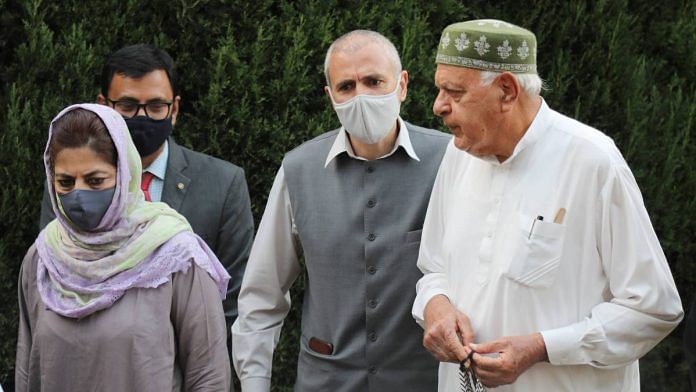
Srinagar: The Peoples Alliance for Gupkar Declaration (PAGD), a conglomerate of national and regional political parties of Jammu and Kashmir, Saturday announced it would contest the maiden District Development Council (DDC) elections to be held in the Union Territory.
“The PAGD has unanimously decided to fight the upcoming DDC elections unitedly. In a meeting attended by all constituents it was decided that despite the abruptness of the DDC elections, it is important that this sacred space in democracy is not allowed to be invaded by divisive forces,” the alliance stated in a statement issued after a meeting held in the Jammu region.
ThePrint on 5 November had reported that PAGD will likely take part in the first ever DDC polls. The alliance, which was formed to fight for the restoration of J&K’s special status, had been debating over the issue as it felt its participation would further legitimise the Modi government’s actions in the region, especially the scrapping of Article 370. However, not participating in the elections would result in the regional parties being left out of the electoral process.
“We met several delegations in Srinagar and in Jammu during the past few days. And our decision to take part in the polls is a result of our interactions with various delegations,” said former MLA and senior leader of CPI(M) M.Y. Tarigami.
“We have decided to fight the elections together,” Tarigami added.
The PAGD comprises the National Conference (NC), the People Democratic Party (PDP), the CPI(M), CPI, J&K People’s Conference, Awami National Conference and the People’s Movement.
In October, the central government amended the Jammu and Kashmir’s Panchayati Raj Act, 1989, to establish DDCs in all districts of the new UT.
The DDC elections, the first polls to be held in J&K since the scrapping of Article 370 last August, will take place in eight phases from 28 November to 22 December. Every district will be divided into 14 territorial constituencies, with elections covering 280 constituencies in total.
Besides the DDC polls, elections will also be held simultaneously in 228 vacant seats in urban local bodies and 13,241 panch and sarpanch seats that were left vacant since the NC and PDP, the two main regional parties, had boycotted the 2018 elections.
J&K had witnessed Block Development Council elections last year, but only elected panches and sarpanches had participated in it.
‘Decision doesn’t change our demand’
The PAGD’s participation in the election remained uncertain thus far since it does not accept the constitutional changes brought about by the Modi government, starting from the scrapping of Article 370 on 5 August last year and the subsequent actions taken, such as introduction of the domicile law and land laws.
“We could have not allowed BJP a free run. If they win due to us boycotting the polls, they will tell the world that people of Kashmir are with their 5 August decision. The truth is not only people in Kashmir, but also in Jammu and Ladakh are unhappy. You see various alliances emerge in all three regions demanding back the constitutional rights taken back from us,” a PAGD source told ThePrint.
A second PAGD source said, “If we emerge victorious, it will be a clear message that people of Kashmir want pre-5 August status.”
Politicians, however, are fearful of the perception the people might have of the PAGD’s decision to fight the polls.
“There might be people who think that the alliance might have accepted the 5 August decision or the subsequent changes. This does not change anything … our demands are the same,” a PDP leader said.
An NC leader added: “Personally, I would have not gone for the decision, but we have to make some sacrifices. We are hoping people understand our reasons.”
Subscribe to our channels on YouTube & Telegram
Why news media is in crisis & How you can fix it
India needs free, fair, non-hyphenated and questioning journalism even more as it faces multiple crises.
But the news media is in a crisis of its own. There have been brutal layoffs and pay-cuts. The best of journalism is shrinking, yielding to crude prime-time spectacle.
ThePrint has the finest young reporters, columnists and editors working for it. Sustaining journalism of this quality needs smart and thinking people like you to pay for it. Whether you live in India or overseas, you can do it here.